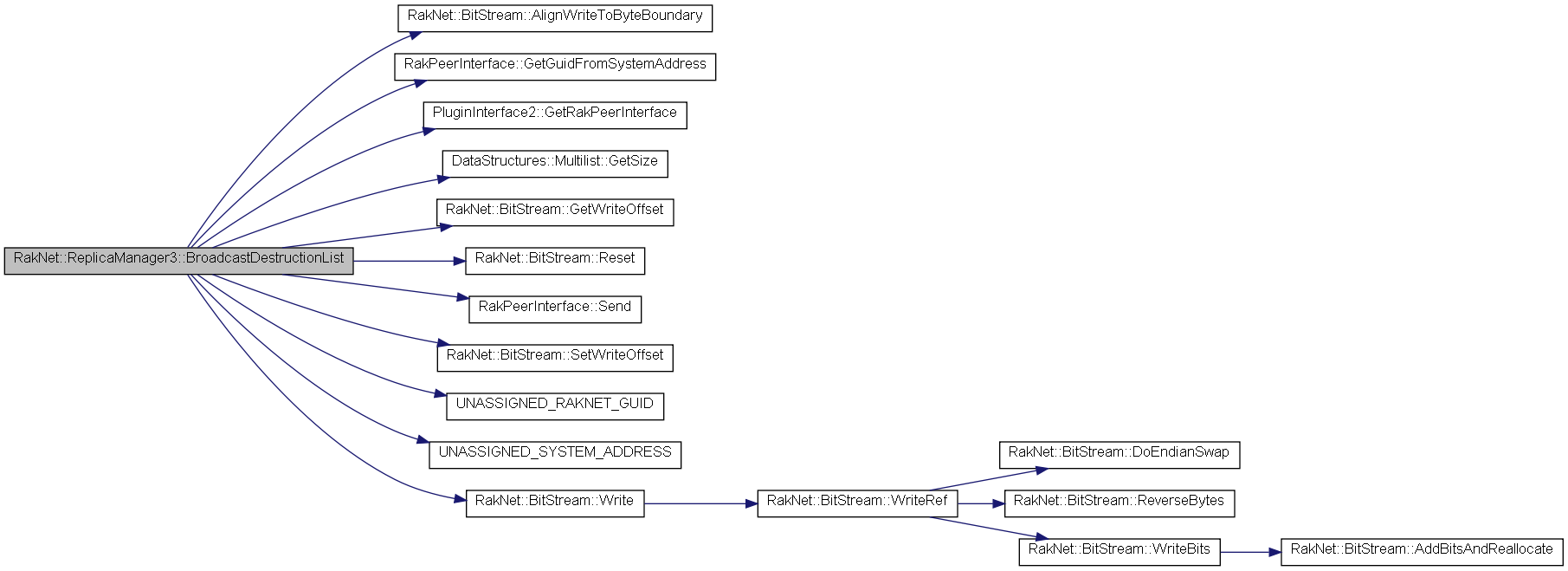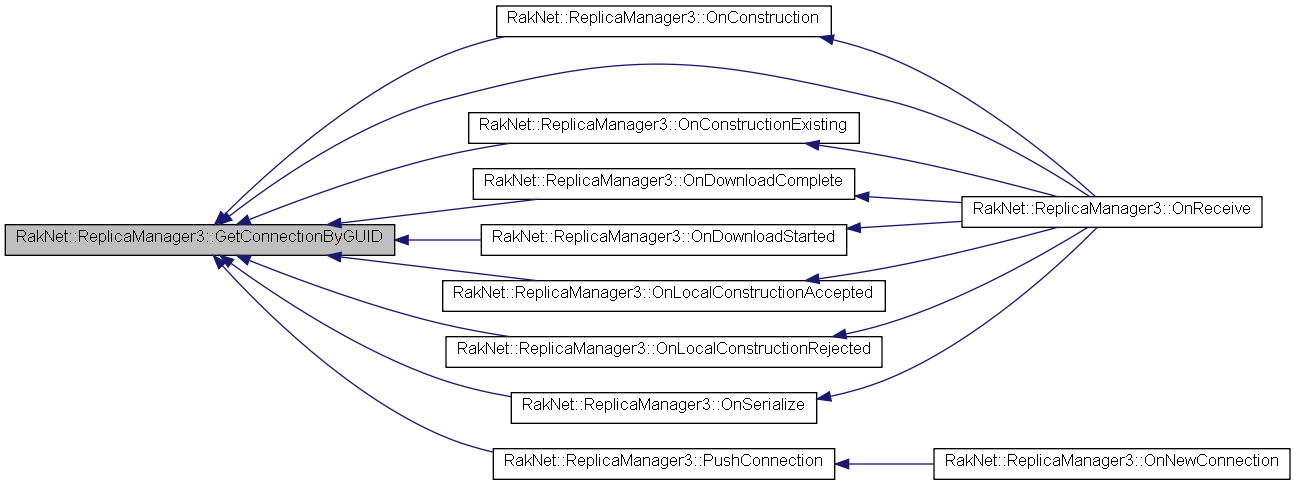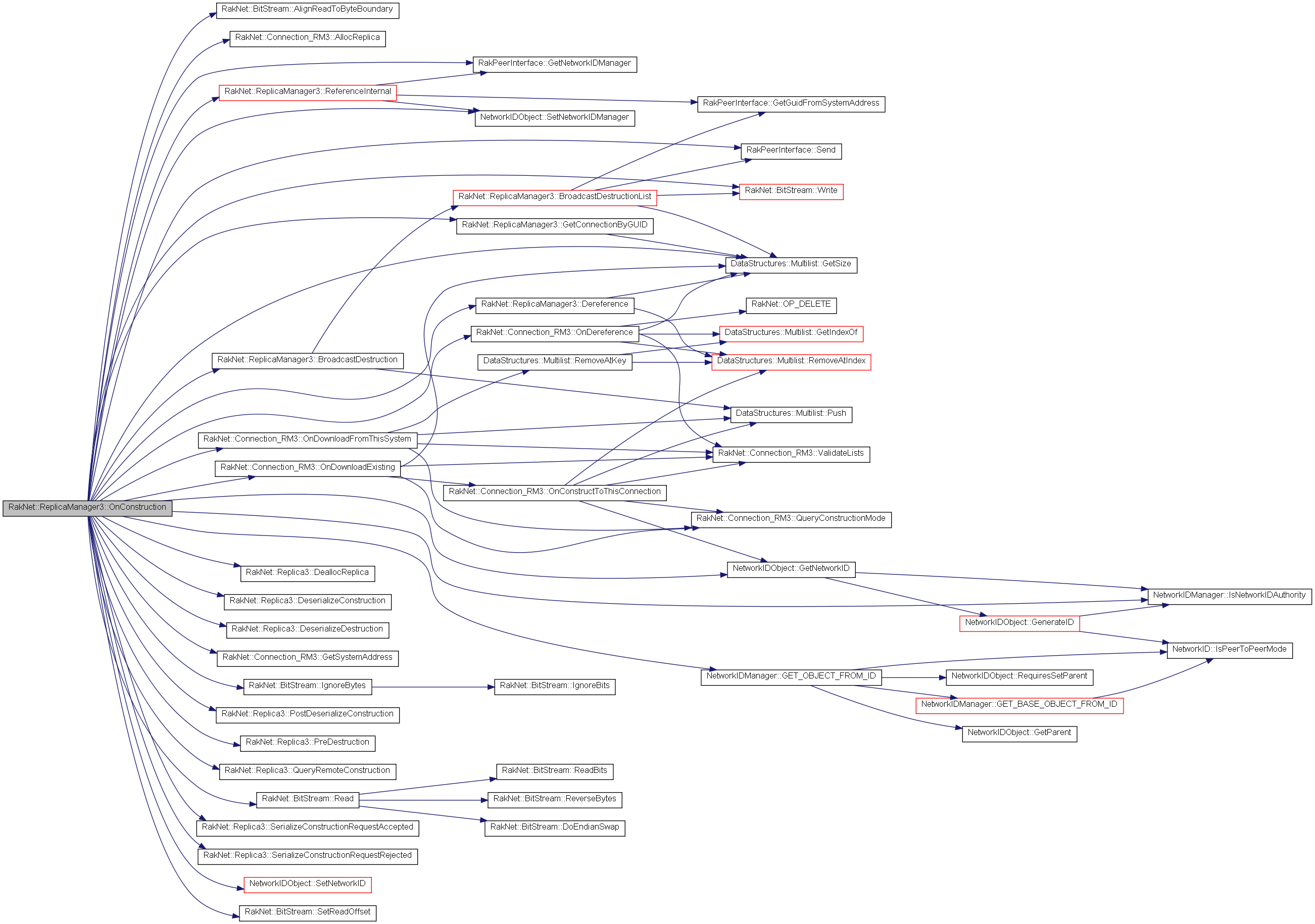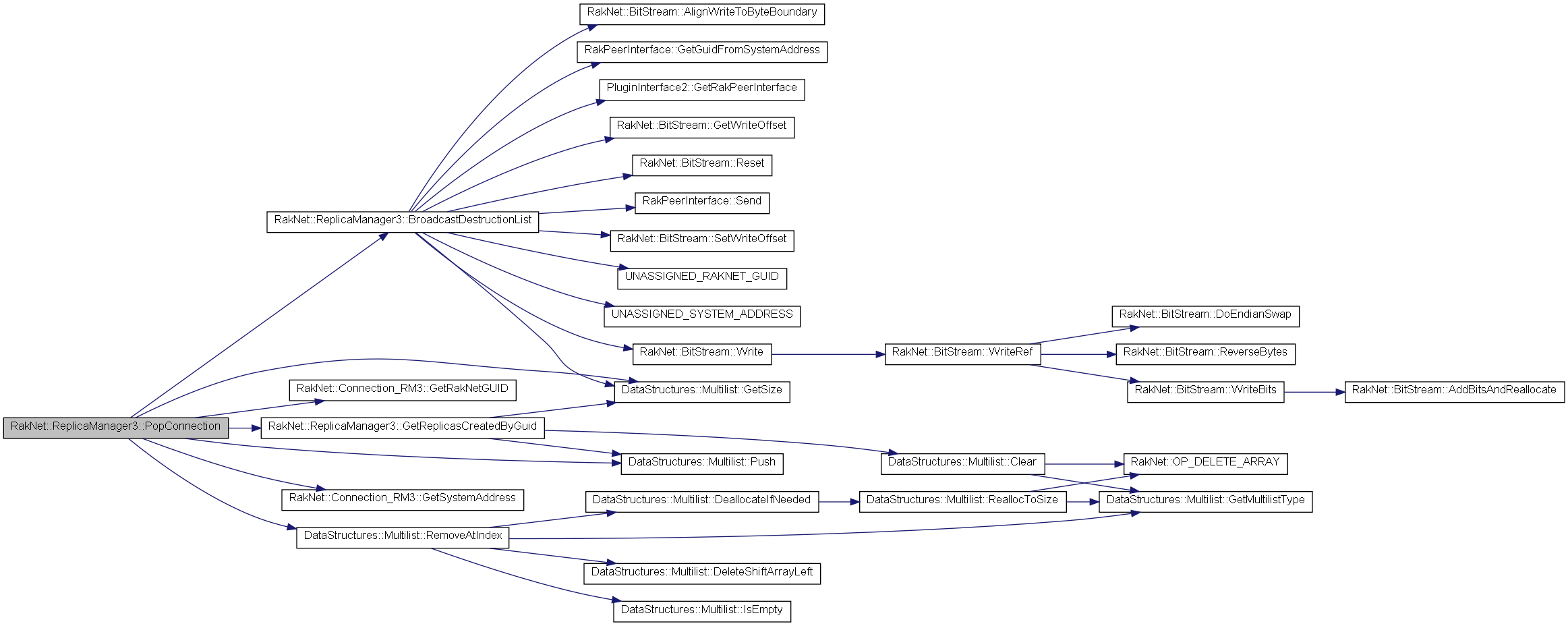System to help automate game object construction, destruction, and serialization. More...
#include <ReplicaManager3.h>
Inherits PluginInterface2.

Public Member Functions | |
| ReplicaManager3 () | |
| virtual | ~ReplicaManager3 () |
| virtual Connection_RM3 * | AllocConnection (SystemAddress systemAddress, RakNetGUID rakNetGUID) const =0 |
| Implement to return a game specific derivation of Connection_RM3. | |
| virtual void | DeallocConnection (Connection_RM3 *connection) const =0 |
| Implement to destroy a class instanced returned by AllocConnection(). | |
| void | SetAutoManageConnections (bool autoCreate, bool autoDestroy) |
| Enable or disable automatically assigning connections to new instances of Connection_RM3. | |
| bool | PushConnection (RakNet::Connection_RM3 *newConnection) |
| Track a new Connection_RM3 instance. | |
| RakNet::Connection_RM3 * | PopConnection (RakNetGUID guid) |
| Stop tracking a connection. | |
| void | Reference (RakNet::Replica3 *replica3) |
| Adds a replicated object to the system. | |
| void | Dereference (RakNet::Replica3 *replica3) |
| Removes a replicated object from the system. | |
| void | DereferenceList (DataStructures::Multilist< ML_STACK, Replica3 * > &replicaListIn) |
| Removes multiple replicated objects from the system. | |
| void | GetReplicasCreatedByGuid (RakNetGUID guid, DataStructures::Multilist< ML_STACK, Replica3 * > &replicaListOut) |
| Returns all objects originally created by a particular system. | |
| void | GetReplicasCreatedByMe (DataStructures::Multilist< ML_STACK, Replica3 * > &replicaListOut) |
| Returns all objects originally created by your system. | |
| void | GetReferencedReplicaList (DataStructures::Multilist< ML_STACK, Replica3 * > &replicaListOut) |
| Returns the entire list of Replicas that we know about. | |
| unsigned | GetReplicaCount (void) const |
| Returns the number of replicas known about. | |
| Replica3 * | GetReplicaAtIndex (unsigned index) |
| Returns a replica by index. | |
| DataStructures::DefaultIndexType | GetConnectionCount (void) const |
| Returns the number of connections. | |
| Connection_RM3 * | GetConnectionAtIndex (unsigned index) const |
| Returns a connection pointer previously added with PushConnection(). | |
| Connection_RM3 * | GetConnectionBySystemAddress (SystemAddress sa) const |
| Returns a connection pointer previously added with PushConnection(). | |
| Connection_RM3 * | GetConnectionByGUID (RakNetGUID guid) const |
| Returns a connection pointer previously added with PushConnection.(). | |
| void | SetDefaultOrderingChannel (char def) |
| void | SetDefaultPacketPriority (PacketPriority def) |
| void | SetDefaultPacketReliability (PacketReliability def) |
| void | SetAutoSerializeInterval (RakNetTime intervalMS) |
| void | GetConnectionsThatHaveReplicaConstructed (Replica3 *replica, DataStructures::Multilist< ML_STACK, Connection_RM3 * > &connectionsThatHaveConstructedThisReplica) |
| Return the connections that we think have an instance of the specified Replica3 instance. | |
| void | SetWorldID (unsigned char id) |
| Defines the unique instance of ReplicaManager3 if multiple instances are on the same instance of RakPeerInterface. | |
| unsigned char | GetWorldID (void) const |
| void | SetNetworkIDManager (NetworkIDManager *_networkIDManager) |
| NetworkIDManager * | GetNetworkIDManager (void) const |
| Returns what was passed to SetNetworkIDManager(), or the instance on RakPeerInterface if unset. | |
| void | BroadcastDestructionList (DataStructures::Multilist< ML_STACK, Replica3 * > &replicaList, SystemAddress exclusionAddress) |
| void | BroadcastDestruction (Replica3 *replica, SystemAddress exclusionAddress) |
| void | Clear (void) |
| PRO | GetDefaultSendParameters (void) const |
Protected Member Functions | |
| virtual PluginReceiveResult | OnReceive (Packet *packet) |
| virtual void | Update (void) |
| Update is called every time a packet is checked for . | |
| virtual void | OnClosedConnection (SystemAddress systemAddress, RakNetGUID rakNetGUID, PI2_LostConnectionReason lostConnectionReason) |
| virtual void | OnNewConnection (SystemAddress systemAddress, RakNetGUID rakNetGUID, bool isIncoming) |
| virtual void | OnRakPeerShutdown (void) |
| Called when RakPeer is shutdown. | |
| void | OnConstructionExisting (unsigned char *packetData, int packetDataLength, RakNetGUID senderGuid, unsigned char packetDataOffset) |
| void | OnConstruction (unsigned char *packetData, int packetDataLength, RakNetGUID senderGuid, unsigned char packetDataOffset) |
| void | OnSerialize (unsigned char *packetData, int packetDataLength, RakNetGUID senderGuid, RakNetTime timestamp, unsigned char packetDataOffset) |
| void | OnDownloadStarted (unsigned char *packetData, int packetDataLength, RakNetGUID senderGuid, unsigned char packetDataOffset) |
| void | OnDownloadComplete (unsigned char *packetData, int packetDataLength, RakNetGUID senderGuid, unsigned char packetDataOffset) |
| void | OnLocalConstructionRejected (unsigned char *packetData, int packetDataLength, RakNetGUID senderGuid, unsigned char packetDataOffset) |
| void | OnLocalConstructionAccepted (unsigned char *packetData, int packetDataLength, RakNetGUID senderGuid, unsigned char packetDataOffset) |
| RakNet::Connection_RM3 * | PopConnection (DataStructures::DefaultIndexType index) |
| Replica3 * | GetReplicaByNetworkID (NetworkID networkId) |
| DataStructures::DefaultIndexType | ReferenceInternal (RakNet::Replica3 *replica3) |
Protected Attributes | |
| DataStructures::Multilist < ML_STACK, Connection_RM3 * > | connectionList |
| DataStructures::Multilist < ML_STACK, Replica3 * > | userReplicaList |
| PRO | defaultSendParameters |
| RakNetTime | autoSerializeInterval |
| RakNetTime | lastAutoSerializeOccurance |
| unsigned char | worldId |
| NetworkIDManager * | networkIDManager |
| bool | autoCreateConnections |
| bool | autoDestroyConnections |
Friends | |
| class | Connection_RM3 |
Detailed Description
System to help automate game object construction, destruction, and serialization.
ReplicaManager3 tracks your game objects and automates the networking for replicating them across the network
As objects are created, destroyed, or serialized differently, those changes are pushed out to other systems.
To use:
- Derive from Connection_RM3 and implement Connection_RM3::AllocReplica(). This is a factory function where given a user-supplied identifier for a class (such as name) return an instance of that class. Should be able to return any networked object in your game.
- Derive from ReplicaManager3 and implement AllocConnection() and DeallocConnection() to return the class you created in step 1.
- Derive your networked game objects from Replica3. All pure virtuals have to be implemented, however defaults are provided for Replica3::QueryConstruction(), Replica3::QueryRemoteConstruction(), and Replica3::QuerySerialization() depending on your network architecture.
- When a new game object is created on the local system, pass it to ReplicaManager3::Reference().
- When a game object is destroyed on the local system, and you want other systems to know about it, call Replica3::BroadcastDestruction()
At this point, all new connections will automatically download, get construction messages, get destruction messages, and update serialization automatically.
Definition at line 68 of file ReplicaManager3.h.
Constructor & Destructor Documentation
| ReplicaManager3::ReplicaManager3 | ( | ) |
Definition at line 48 of file ReplicaManager3.cpp.
| ReplicaManager3::~ReplicaManager3 | ( | ) | [virtual] |
Member Function Documentation
| virtual Connection_RM3* RakNet::ReplicaManager3::AllocConnection | ( | SystemAddress | systemAddress, | |
| RakNetGUID | rakNetGUID | |||
| ) | const [pure virtual] |
Implement to return a game specific derivation of Connection_RM3.
The connection object represents a remote system connected to you that is using the ReplicaManager3 system.
It has functions to perform operations per-connection.
AllocConnection() and DeallocConnection() are factory functions to create and destroy instances of the connection object.
It is used if autoCreate is true via SetAutoManageConnections() (true by default). Otherwise, the function is not called, and you will have to call PushConnection() manually
- Note:
- If you do not want a new network connection to immediately download game objects, SetAutoManageConnections() and PushConnection() are how you do this.
- See also:
- SetAutoManageConnections()
- Parameters:
-
[in] systemAddress Address of the system you are adding [in] rakNetGUID GUID of the system you are adding. See Packet::rakNetGUID or RakPeerInterface::GetGUIDFromSystemAddress()
- Returns:
- The new connection instance.

| void ReplicaManager3::BroadcastDestruction | ( | Replica3 * | replica, | |
| SystemAddress | exclusionAddress | |||
| ) |
Definition at line 1160 of file ReplicaManager3.cpp.


| void ReplicaManager3::BroadcastDestructionList | ( | DataStructures::Multilist< ML_STACK, Replica3 * > & | replicaList, | |
| SystemAddress | exclusionAddress | |||
| ) |
Send a network command to destroy one or more Replica3 instances Usually you won't need this, but use Replica3::BroadcastDestruction() instead. The objects are unaffected locally
- Parameters:
-
[in] replicaList List of Replica3 objects to tell other systems to destroy. [in] exclusionAddress Which system to not send to. UNASSIGNED_SYSTEM_ADDRESS to send to all.
Definition at line 1108 of file ReplicaManager3.cpp.


| void ReplicaManager3::Clear | ( | void | ) |
Definition at line 364 of file ReplicaManager3.cpp.


| virtual void RakNet::ReplicaManager3::DeallocConnection | ( | Connection_RM3 * | connection | ) | const [pure virtual] |
Implement to destroy a class instanced returned by AllocConnection().
Most likely just implement as {delete connection;}
It is used if autoDestroy is true via SetAutoManageConnections() (true by default). Otherwise, the function is not called and you would then be responsible for deleting your own connection objects.
- Parameters:
-
[in] connection The pointer instance to delete

| void ReplicaManager3::Dereference | ( | RakNet::Replica3 * | replica3 | ) |
Removes a replicated object from the system.
The object is not deallocated, it is up to the caller to do so.
This is called automatically from the destructor of Replica3, so you don't need to call it manually unless you want to stop tracking an object before it is destroyed.
- Parameters:
-
[in] replica3 The object to stop tracking
Definition at line 206 of file ReplicaManager3.cpp.


| void ReplicaManager3::DereferenceList | ( | DataStructures::Multilist< ML_STACK, Replica3 * > & | replicaListIn | ) |
Removes multiple replicated objects from the system.
Same as Dereference(), but for a list of objects.
Useful with the lists returned by GetReplicasCreatedByGuid(), GetReplicasCreatedByMe(), or GetReferencedReplicaList().
- Parameters:
-
[in] replicaListIn List of objects
Definition at line 227 of file ReplicaManager3.cpp.

| Connection_RM3 * ReplicaManager3::GetConnectionAtIndex | ( | unsigned | index | ) | const |
Returns a connection pointer previously added with PushConnection().
- Parameters:
-
[in] index An index, from 0 to GetConnectionCount()-1.
- Returns:
- A Connection_RM3 pointer
Definition at line 286 of file ReplicaManager3.cpp.
| Connection_RM3 * ReplicaManager3::GetConnectionByGUID | ( | RakNetGUID | guid | ) | const |
Returns a connection pointer previously added with PushConnection.().
- Parameters:
-
[in] guid The guid of the connection to return
- Returns:
- A Connection_RM3 pointer, or 0 if not found
Definition at line 308 of file ReplicaManager3.cpp.


| Connection_RM3 * ReplicaManager3::GetConnectionBySystemAddress | ( | SystemAddress | sa | ) | const |
Returns a connection pointer previously added with PushConnection().
- Parameters:
-
[in] sa The system address of the connection to return
- Returns:
- A Connection_RM3 pointer, or 0 if not found
Definition at line 293 of file ReplicaManager3.cpp.

| DataStructures::DefaultIndexType ReplicaManager3::GetConnectionCount | ( | void | ) | const |
Returns the number of connections.
Returns the number of connections added with ReplicaManager3::PushConnection(), minus the number removed with ReplicaManager3::PopConnection()
- Returns:
- The number of registered connections
Definition at line 279 of file ReplicaManager3.cpp.

| void ReplicaManager3::GetConnectionsThatHaveReplicaConstructed | ( | Replica3 * | replica, | |
| DataStructures::Multilist< ML_STACK, Connection_RM3 * > & | connectionsThatHaveConstructedThisReplica | |||
| ) |
Return the connections that we think have an instance of the specified Replica3 instance.
This can be wrong, for example if that system locally deleted the outside the scope of ReplicaManager3, if QueryRemoteConstruction() returned false, or if DeserializeConstruction() returned false.
- Parameters:
-
[in] replica The replica to check against. [out] connectionsThatHaveConstructedThisReplica Populated with connection instances that we believe have replica allocated
Definition at line 351 of file ReplicaManager3.cpp.

| PRO ReplicaManager3::GetDefaultSendParameters | ( | void | ) | const |
| NetworkIDManager * ReplicaManager3::GetNetworkIDManager | ( | void | ) | const |
Returns what was passed to SetNetworkIDManager(), or the instance on RakPeerInterface if unset.
Definition at line 398 of file ReplicaManager3.cpp.
| void ReplicaManager3::GetReferencedReplicaList | ( | DataStructures::Multilist< ML_STACK, Replica3 * > & | replicaListOut | ) |
Returns the entire list of Replicas that we know about.
This is all Replica3 instances passed to Reference, as well as instances we downloaded and created via Connection_RM3::AllocReference()
- Parameters:
-
[out] List of Replica3 instances to be returned
Definition at line 245 of file ReplicaManager3.cpp.
| Replica3 * ReplicaManager3::GetReplicaAtIndex | ( | unsigned | index | ) |
Returns a replica by index.
Returns one of the items in the list that would be returned by GetReferencedReplicaList()
- Parameters:
-
[in] index An index, from 0 to GetReplicaCount()-1.
- Returns:
- A Replica3 instance
Definition at line 272 of file ReplicaManager3.cpp.
| unsigned ReplicaManager3::GetReplicaCount | ( | void | ) | const |
Returns the number of replicas known about.
Returns the size of the list that would be returned by GetReferencedReplicaList()
- Returns:
- How many replica objects are in the list of replica objects
Definition at line 265 of file ReplicaManager3.cpp.

| void ReplicaManager3::GetReplicasCreatedByGuid | ( | RakNetGUID | guid, | |
| DataStructures::Multilist< ML_STACK, Replica3 * > & | replicaListOut | |||
| ) |
Returns all objects originally created by a particular system.
Originally created is defined as the value of Replica3::creatingSystemGUID, which is automatically assigned in ReplicaManager3::Reference().
You do not have to be directly connected to that system to get the objects originally created by that system.
- Parameters:
-
[in] guid GUID of the system we are referring to. Originally passed as the guid parameter to ReplicaManager3::AllocConnection() [out] List of Replica3 instances to be returned
Definition at line 251 of file ReplicaManager3.cpp.


| void ReplicaManager3::GetReplicasCreatedByMe | ( | DataStructures::Multilist< ML_STACK, Replica3 * > & | replicaListOut | ) |
Returns all objects originally created by your system.
Calls GetReplicasCreatedByGuid() for your own system guid.
- Parameters:
-
[out] List of Replica3 instances to be returned
Definition at line 237 of file ReplicaManager3.cpp.

| unsigned char ReplicaManager3::GetWorldID | ( | void | ) | const |
- Returns:
- Whatever was passed to SetWorldID(), or 0 if it was never called.
Definition at line 391 of file ReplicaManager3.cpp.

| void ReplicaManager3::OnClosedConnection | ( | SystemAddress | systemAddress, | |
| RakNetGUID | rakNetGUID, | |||
| PI2_LostConnectionReason | lostConnectionReason | |||
| ) | [protected, virtual] |
Called when a connection is dropped because the user called RakPeer::CloseConnection() for a particular system
- Parameters:
-
[in] systemAddress The system whose connection was closed [in] rakNetGuid The guid of the specified system [in] lostConnectionReason How the connection was closed: manually, connection lost, or notification of disconnection
Reimplemented from PluginInterface2.
Definition at line 711 of file ReplicaManager3.cpp.

| void ReplicaManager3::OnConstruction | ( | unsigned char * | packetData, | |
| int | packetDataLength, | |||
| RakNetGUID | senderGuid, | |||
| unsigned char | packetDataOffset | |||
| ) | [protected] |
Definition at line 783 of file ReplicaManager3.cpp.


| void ReplicaManager3::OnConstructionExisting | ( | unsigned char * | packetData, | |
| int | packetDataLength, | |||
| RakNetGUID | senderGuid, | |||
| unsigned char | packetDataOffset | |||
| ) | [protected] |
Definition at line 755 of file ReplicaManager3.cpp.


| void ReplicaManager3::OnDownloadComplete | ( | unsigned char * | packetData, | |
| int | packetDataLength, | |||
| RakNetGUID | senderGuid, | |||
| unsigned char | packetDataOffset | |||
| ) | [protected] |
Definition at line 994 of file ReplicaManager3.cpp.


| void ReplicaManager3::OnDownloadStarted | ( | unsigned char * | packetData, | |
| int | packetDataLength, | |||
| RakNetGUID | senderGuid, | |||
| unsigned char | packetDataOffset | |||
| ) | [protected] |
Definition at line 982 of file ReplicaManager3.cpp.


| void ReplicaManager3::OnLocalConstructionAccepted | ( | unsigned char * | packetData, | |
| int | packetDataLength, | |||
| RakNetGUID | senderGuid, | |||
| unsigned char | packetDataOffset | |||
| ) | [protected] |
Definition at line 1029 of file ReplicaManager3.cpp.


| void ReplicaManager3::OnLocalConstructionRejected | ( | unsigned char * | packetData, | |
| int | packetDataLength, | |||
| RakNetGUID | senderGuid, | |||
| unsigned char | packetDataOffset | |||
| ) | [protected] |
Definition at line 1006 of file ReplicaManager3.cpp.


| void ReplicaManager3::OnNewConnection | ( | SystemAddress | systemAddress, | |
| RakNetGUID | rakNetGUID, | |||
| bool | isIncoming | |||
| ) | [protected, virtual] |
Called when we got a new connection
- Parameters:
-
[in] systemAddress Address of the new connection [in] rakNetGuid The guid of the specified system [in] isIncoming If true, this is ID_NEW_INCOMING_CONNECTION, or the equivalent
Reimplemented from PluginInterface2.
Definition at line 725 of file ReplicaManager3.cpp.

| void ReplicaManager3::OnRakPeerShutdown | ( | void | ) | [protected, virtual] |
Called when RakPeer is shutdown.
Reimplemented from PluginInterface2.
Definition at line 738 of file ReplicaManager3.cpp.

| PluginReceiveResult ReplicaManager3::OnReceive | ( | Packet * | packet | ) | [protected, virtual] |
OnReceive is called for every packet.
- Parameters:
-
[in] packet the packet that is being returned to the user
- Returns:
- True to allow the game and other plugins to get this message, false to absorb it
Reimplemented from PluginInterface2.
Definition at line 414 of file ReplicaManager3.cpp.

| void ReplicaManager3::OnSerialize | ( | unsigned char * | packetData, | |
| int | packetDataLength, | |||
| RakNetGUID | senderGuid, | |||
| RakNetTime | timestamp, | |||
| unsigned char | packetDataOffset | |||
| ) | [protected] |
Definition at line 945 of file ReplicaManager3.cpp.


| RakNet::Connection_RM3 * ReplicaManager3::PopConnection | ( | RakNetGUID | guid | ) |
Stop tracking a connection.
On call, for each replica returned by GetReplicasCreatedByGuid(), QueryActionOnPopConnection() will be called. Depending on the return value, this may delete the corresponding replica.
If autoDestroy is true in the call to SetAutoManageConnections() (true by default) then this is called automatically when the connection is lost. In that case, the returned connection instance is deleted.
- Parameters:
-
[in] guid of the connection to get. Passed to ReplicaManager3::AllocConnection() originally.
Definition at line 150 of file ReplicaManager3.cpp.


| RakNet::Connection_RM3 * ReplicaManager3::PopConnection | ( | DataStructures::DefaultIndexType | index | ) | [protected] |
| bool ReplicaManager3::PushConnection | ( | RakNet::Connection_RM3 * | newConnection | ) |
Track a new Connection_RM3 instance.
If autoCreate is false for SetAutoManageConnections(), then you need this function to add new instances of Connection_RM3 yourself.
You don't need to track this pointer yourself, you can get it with GetConnectionAtIndex(), GetConnectionByGUID(), or GetConnectionBySystemAddress().
- Parameters:
-
[in] newConnection The new connection instance to track.
Definition at line 79 of file ReplicaManager3.cpp.


| void ReplicaManager3::Reference | ( | RakNet::Replica3 * | replica3 | ) |
Adds a replicated object to the system.
Anytime you create a new object that derives from Replica3, and you want ReplicaManager3 to use it, pass it to Reference().
Remote systems already connected will potentially download this object the next time ReplicaManager3::Update() is called, which happens every time you call RakPeerInterface::Receive().
- Parameters:
-
[in] replica3 The object to start tracking
Definition at line 166 of file ReplicaManager3.cpp.

| DataStructures::DefaultIndexType ReplicaManager3::ReferenceInternal | ( | RakNet::Replica3 * | replica3 | ) | [protected] |
Definition at line 186 of file ReplicaManager3.cpp.


| void ReplicaManager3::SetAutoManageConnections | ( | bool | autoCreate, | |
| bool | autoDestroy | |||
| ) |
Enable or disable automatically assigning connections to new instances of Connection_RM3.
ReplicaManager3 can automatically create and/or destroy Connection_RM3 as systems connect or disconnect from RakPeerInterface.
By default this is on, to make the system easier to learn and setup.
If you don't want all connections to take part in the game, or you want to delay when a connection downloads the game, set autoCreate to false.
If you want to delay deleting a connection that has dropped, set autoDestroy to false. If you do this, then you must call PopConnection() to remove that connection from being internally tracked. You'll also have to delete the connection instance on your own.
- Parameters:
-
[in] autoCreate Automatically call ReplicaManager3::AllocConnection() for each new connection. Defaults to true. [in] autoDestroy Automatically call ReplicaManager3::DeallocConnection() for each dropped connection. Defaults to true.
Definition at line 71 of file ReplicaManager3.cpp.
| void ReplicaManager3::SetAutoSerializeInterval | ( | RakNetTime | intervalMS | ) |
Every intervalMS milliseconds, Connection_RM3::OnAutoserializeInterval() will be called.
Defaults to 30.
Pass with 0 to disable.
If you want to control the update interval with more granularity, use the return values from Replica3::Serialize().
- Parameters:
-
[in] intervalMS How frequently to autoserialize all objects. This controls the maximum number of game object updates per second.
Definition at line 344 of file ReplicaManager3.cpp.
| void ReplicaManager3::SetDefaultOrderingChannel | ( | char | def | ) |
- Parameters:
-
[in] Default ordering channel to use for object creation, destruction, and serializations
Definition at line 323 of file ReplicaManager3.cpp.
| void ReplicaManager3::SetDefaultPacketPriority | ( | PacketPriority | def | ) |
- Parameters:
-
[in] Default packet priority to use for object creation, destruction, and serializations
Definition at line 330 of file ReplicaManager3.cpp.
| void ReplicaManager3::SetDefaultPacketReliability | ( | PacketReliability | def | ) |
- Parameters:
-
[in] Default packet reliability to use for object creation, destruction, and serializations
Definition at line 337 of file ReplicaManager3.cpp.
| void ReplicaManager3::SetNetworkIDManager | ( | NetworkIDManager * | _networkIDManager | ) |
Sets the networkIDManager instance that this plugin relys upon.
Uses whatever instance is attached to RakPeerInterface if unset.
To support multiple worlds, you should set it to a different manager for each instance of the plugin
- Parameters:
-
[in] _networkIDManager The externally allocated NetworkIDManager instance for this plugin to use.
Definition at line 405 of file ReplicaManager3.cpp.

| void ReplicaManager3::SetWorldID | ( | unsigned char | id | ) |
Defines the unique instance of ReplicaManager3 if multiple instances are on the same instance of RakPeerInterface.
ReplicaManager3 supports multiple instances of itself attached to the same instance of rakPeer, in case your game has multiple worlds.
Call SetWorldID with a different number for each instance.
The default worldID is 0.
To use multiple worlds, you will also need to call ReplicaManager3::SetNetworkIDManager() to have a different NetworkIDManager instance per world
Definition at line 384 of file ReplicaManager3.cpp.
| void ReplicaManager3::Update | ( | void | ) | [protected, virtual] |
Update is called every time a packet is checked for .
Reimplemented from PluginInterface2.
Definition at line 647 of file ReplicaManager3.cpp.

Friends And Related Function Documentation
friend class Connection_RM3 [friend] |
Definition at line 269 of file ReplicaManager3.h.
Member Data Documentation
bool RakNet::ReplicaManager3::autoCreateConnections [protected] |
Definition at line 267 of file ReplicaManager3.h.
bool RakNet::ReplicaManager3::autoDestroyConnections [protected] |
Definition at line 267 of file ReplicaManager3.h.
Definition at line 263 of file ReplicaManager3.h.
DataStructures::Multilist<ML_STACK, Connection_RM3*> RakNet::ReplicaManager3::connectionList [protected] |
Definition at line 259 of file ReplicaManager3.h.
PRO RakNet::ReplicaManager3::defaultSendParameters [protected] |
Definition at line 262 of file ReplicaManager3.h.
Definition at line 264 of file ReplicaManager3.h.
Definition at line 266 of file ReplicaManager3.h.
DataStructures::Multilist<ML_STACK, Replica3*> RakNet::ReplicaManager3::userReplicaList [protected] |
Definition at line 260 of file ReplicaManager3.h.
unsigned char RakNet::ReplicaManager3::worldId [protected] |
Definition at line 265 of file ReplicaManager3.h.
The documentation for this class was generated from the following files:




 1.7.1
1.7.1